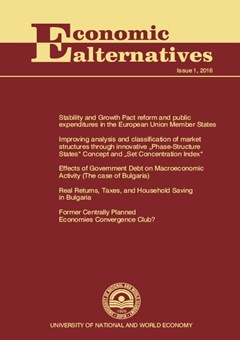Real Returns, Interest Income Tax, and Household Saving in Bulgaria
Author: Dimitar Damyanov
Abstract
The interest rate is the principal determinant of the inter-temporal choice of all economic agents. As such, it takes center stage in economists’ attempts to explain the dynamics of household consumption and saving. This article joins the debate by attempting to estimate the effects of interest rate changes on household saving in Bulgaria in light of the recent introduction of an interest income tax. By applying cointegration and vector error-correction techniques to data for the period 2000 – 2014, the study finds a weak negative association between the two variables, indicating the potential existence of target saving. This result is attributed to the low levels of household incomes and the unavailability of sufficient liquid assets for most of them, as well as to the low level of development of most financial market sectors. It explains the absence of a significant effect on saving from the introduction of the tax in 2013 and also exposes the weak effects of other potential policy measures aimed at altering household consumption and saving through changes in rates of return.

